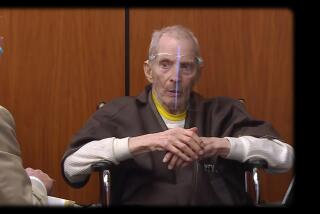A socialite’s world is Exhibit A
- Share via
NEW YORK -- The elegant woman in the forest green frock held up a slender right hand and swore to tell the truth. She was matter-of-fact as she described herself as unemployed, just “an average housewife” taking care of her husband, Henry, and their home.
“Average” to herself perhaps, but not to the jurors and spectators watching Nancy Kissinger testify last week in the trial of Anthony Marshall, who is accused of stealing millions from his mother -- the late philanthropist and socialite Brooke Astor -- in the twilight of her 105-year life.
The testimony inside a chilly Manhattan courtroom over the last two weeks has offered a close-up look at the lives of the fabulously rich and famous, and underscored the disconnect between them and most of America, especially nowadays. Theirs is a world where lavish jewels are handed out as party gifts, where private homes have names, where caterers-to-the-stars cancel ski trips in order to bake dreamy birthday cakes for special clients, and where million-dollar art hangs on the drawing room (don’t call it the living room) walls.
“At how many trials are gold and diamond necklaces passed among the jurors to look at?” said Meryl Gordon, whose book “Mrs. Astor Regrets: The Hidden Betrayals of a Family Beyond Reproach” dissects the scandal that erupted in 2006.
That is when Astor’s grandson, Philip Marshall, accused his father, Anthony, of letting Astor live in squalor in an unheated, dirty Park Avenue apartment while he pilfered her estate. As a result, a judge removed Anthony Marshall as Astor’s legal caretaker and replaced him with her longtime friend Annette de la Renta, wife of fashion designer Oscar de la Renta. Astor died the next year.
But just as the case is fascinating for its peek into the ugly side of beautiful people’s lives, it also touches on issues average Americans can relate to: parental neglect, financial scams, inheritance squabbles.
One spectator, who would give her name only as Judy, said the trial reminded her of the difficulties faced by her own mother in the years before her death -- when, she said, greedy landlords tried to push her out of her Brooklyn rental. “That’s what this whole trial is about, an older woman who was vulnerable. It’s sad. It’s very sad,” Judy said, showing off snapshots of her late mother: a slender woman with carefully coiffed, copper-colored hair who bore a resemblance to Astor.
“I think the notion that something like this could happen to Mrs. Astor, of all people -- one of the most admired and respected women in America -- I think it really struck home,” Gordon said. “Nobody understands what happened to their 401(k)s, but this is something involving money that they can understand.”
At issue is whether Marshall, 84, and his codefendant, lawyer Francis X. Morrissey Jr., took advantage of Astor’s diminished mental capacity to sell off some of her treasured art and amend her will.
Prosecutors say Marshall, onetime U.S. ambassador to Kenya and a Tony Award-winning Broadway producer, wanted to please his wife, Charlene, whom they say Astor loathed. The stooped Marshall, who walks with a cane and is accompanied to court daily by his 66-year-old wife, could spend the rest of his life in prison if convicted of charges that include grand larceny. Morrissey, accused of helping Marshall forge Astor’s signature, faces seven years in prison.
Both men deny wrongdoing.
Their attorneys are trying to show that Astor was not a feeble-minded victim vulnerable to financial sharks. Rather, they say, she was sharp until the end and knew what she was doing when she rewrote her will to grant most of her nearly $200-million fortune to Marshall.
To bolster their case, prosecutors are calling Astor’s inner circle to testify about their late friend, creating extraordinary courtroom exchanges as the stars of New York’s social stratosphere answer dry questions about their juicy lives.
Think “The Great Gatsby” meets “Night Court” -- as when Kissinger, her silvery hair swept back in perfect waves from her face, took the stand.
Asked her husband’s name, she responded, “Henry.”
“I met him while I was working for Nelson Rockefeller,” Kissinger added. Asked why she ended up living in Washington, Kissinger explained: “My husband was secretary of State.”
Drawn into Astor’s social circle, the Kissingers became frequent guests at her New York apartment for dinner parties at the “very long table” in the dining room. One such dinner, in January 2002, honored then-U.N. Secretary-General Kofi Annan, Kissinger recalled.
Annette de la Renta, a guest at the dinner, took the stand after Kissinger and described Astor turning to Henry Kissinger and asking “who that man is,” in reference to Annan. “She was asking who a lot of people were,” said De la Renta, whom knew Astor for nearly 50 years.
Although Astor was decades older than De la Renta, now 69, they saw each other frequently and often exchanged loving, handwritten notes and gifts: Astor on occasion gave her precious gems; De la Renta gave Astor several dresses made by her husband.
Asked the dresses’ value, De la Renta said, “Oh gosh, it depends. If it was made to order, $8,000 to $10,000.”
In the last few years of her life, De la Renta said, Astor’s decline was clear. She went from being “incredibly outgoing, dynamic, charming,” with boundless energy, to someone who rarely initiated conversation. She took to repeating herself and wandering the streets, and expressed an irrational fear that she was going broke, De la Renta said.
Prosecutors allege that Marshall fueled that fear, persuading his mother to sell a valuable painting so he could pocket the proceeds.
The week’s testimony closed with video showing the 100th birthday party that David Rockefeller threw for Astor on March 30, 2002. Jurors and spectators sat transfixed as a giant screen showed revelers bopping on a dance floor and hamming it up for the camera. A jazz band played “Hello, Dolly,” and waiters brought out cakes frosted to look like Easter bonnets, which Astor adored. Each of the 10 tables had a unique bonnet cake, creations of a pastry chef who called off a ski trip to cater the bash.
At one point, the video shows Astor walking slowly to a podium to address her guests. In a gravelly but strong voice, she waves away the praise lavished on her by earlier speakers.
“I really am not so extraordinary. I’m just an ordinary person who has had a very good life,” she says.
Ernest Buehler, a retired accountant who had come from Queens to watch the trial and do some celebrity-gazing, wasn’t convinced.
Of the people in Astor’s world and those on the rain-soaked streets outside the courthouse last week, he said, “they come from two different planets.”
The trial is expected to last at least two months.
More to Read
Sign up for Essential California
The most important California stories and recommendations in your inbox every morning.
You may occasionally receive promotional content from the Los Angeles Times.














